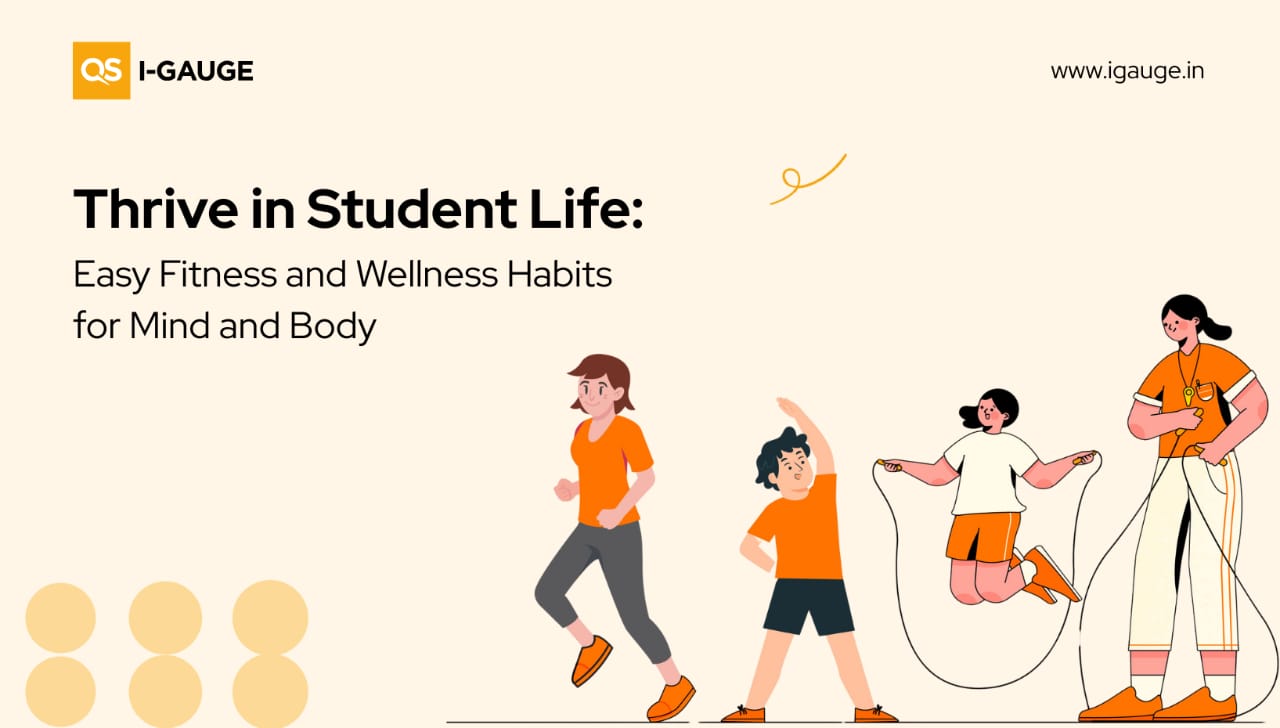
In today’s fast-paced, screen-heavy world, fitness and wellness are crucial for students to maintain mental clarity, emotional balance, and physical health. Regular exercise boosts concentration and reduces stress, while wellness habits build immunity and resilience. Together, they help students navigate academic pressures, social challenges, and lifestyle demands with confidence and a positive mindset.
Here’s a fresh take on how students can stay fit, beat stress, and take care of themselves—even on the busiest days.
Move more, stress less: Quick fitness tips for busy students
· Mini workouts: Just 15–20 minutes of jogging, cycling, or brisk walking daily can boost your mood and energy.
· At-home bodyweight moves: Squats, lunges, planks, and push-ups need no equipment and can be done inside your room.
· Stretch it out: Gentle yoga and stretching improve flexibility and reduce tension—use a free app or YouTube video (from credible sources) for quick and easy access.
· Move between study sessions: Jumping jacks, a walk around the block, or stair climbs can reset your focus between tasks.
Stress management tools to stay calm and focused
Stress is a normal part of student life—but unmanaged, it can spiral. Here are strategies that take only minutes but make a big difference.
· Mindful moments: Practice daily meditation or breathing exercises to reduce anxiety. Even five minutes helps.
· The 4-7-8 breathing technique: Inhale for 4 seconds, hold for 7, exhale for 8. This calms the nervous system quickly.
· Muscle relaxation: Tense and relax each muscle group—ideal before sleep or during high-stress times.
· Plan with purpose: Break large tasks into smaller steps and use a planner or digital calendar to stay on track.
· Get creative: Drawing, music, or any creative hobby can serve as a powerful mental recharge.
Self-Care Isn’t optional: Stay balanced and energised
Well-being isn’t just about working out—it’s about how you fuel, rest, and relate to others.
· Prioritise sleep: Aim for 7–9 hours a night. Sleep supports memory, mood, and focus.
· Eat to feel good: Choose balanced meals with fruits, veggies, whole grains, and protein. Cut back on sugar and caffeine.
· Stay connected: Don’t bottle things up. Talk to friends, family, or a counsellor when you’re feeling low.
· Set achievable goals: Break long-term aspirations into bite-sized milestones to stay motivated and avoid burnout.
· Take intentional breaks: Short, relaxing breaks during study sessions can increase productivity and prevent exhaustion.
Here are some case studies on fitness, wellness and academic success
Case Study 1: Physical activity & academic performance
A 2023 study found that Indian adolescents who engaged in 1–2 hours of physical activity on weekends scored significantly higher—up to 3.25 standard deviations more—than their peers who didn’t exercise. Cognitive ability explained 91% of the improvement. However, performance declined when exercise exceeded two hours, highlighting the importance of moderation. Regular, moderate activity boosted both brain function and stress management.
Case Study 2: Resilience program for dietetics students
A cohort study showed that 95% of student dietitians experienced high stress during practical training sessions. After a resilience and wellbeing program, 99% found it helpful—especially in managing stress and prioritising self-care. Students reported better balance, emotional resilience, and personal growth, even amid challenges like the COVID-19 pandemic.
Case Study 3: Yoga & meditation reduce student stress
In a study with 100 medical and engineering students, those who practiced yoga and meditation reported significantly lower stress—from exams to finances. The intervention improved emotional well-being, focus, and mental clarity, all contributing to better academic outcomes.
Case Study 4: Fitness & mental health in students
A 10-year Taiwanese study of 1.9 million students found that higher fitness levels were linked to lower risks of anxiety, depression, and ADHD. Regular physical activity boosted resilience, helping students manage academic stress and improve mental health. Simple routines like walking, cycling, or sports made a lasting impact.
Case Study 5: Weight management and student well-being
At William and Mary University, a student joined the campus Weight Watchers program and lost 20 pounds through balanced eating and fitness classes like yoga and cardio dance. Peer support and campus resources helped her stay motivated. She credited a structured routine and supportive environment for reducing academic stress and improving overall well-being.
Final Thoughts: Small steps, lasting impact
Fitness and wellness don’t require major lifestyle changes. Small, consistent habits can reshape your student experience. When your body and mind are well cared for, success in academics and life becomes far more achievable.
Disclaimer
The blog is curated by referring to various credible sources and does not necessarily reflect the opinions or positions of QS I-GAUGE. The information provided is for general informational purposes only, readers are advised to conduct their own research and seek professional advice before making any decisions.
References
https://grad.uc.edu/student-life/news/six-strategies-for-effective-stress-management.html
https://www.verywellmind.com/top-school-stress-relievers-for-students-3145179
https://summer.harvard.edu/blog/managing-stress-in-high-school/
https://www.frontiersin.org/journals/psychology/articles/10.3389/fpsyg.2023.1226007/full
https://pmc.ncbi.nlm.nih.gov/articles/PMC9545560/
https://coynemedical.com/balancing-academic-stress-and-mental-health/




